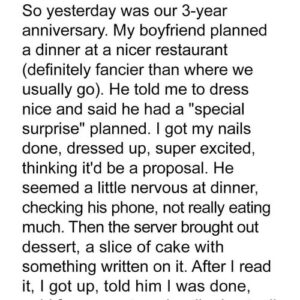Chapter 1: A Quiet Sanctuary
Good fences make good neighbors. That’s the saying that Brenda, our elderly neighbor, used to live by. But as I came to learn, sometimes, it’s not just the fences that hold a neighborhood together—sometimes, it’s the people. And for our neighborhood, that person was Brenda.
I’m Jake, a 42-year-old guy, living with my wife, Rachel, and our 13-year-old daughter, Ellie. We’d been part of this community for six years now, and if there’s one thing that defines this block, it’s Brenda.
Brenda, at 67, had a presence that could only be described as soothing. She was always wearing a cardigan, her smile sweet enough to make you feel at home, and she always seemed to know when to lend an ear or share a warm slice of pie. We moved into the neighborhood when I was in my mid-thirties, and right from the start, Brenda had this way of making us feel like we’d been here forever. Her house wasn’t anything extraordinary, just a modest bungalow, but it had something none of the other houses had: the most beautiful rose garden you could imagine.
That rose garden wasn’t just a backyard feature; it was the heart of Brenda’s home. Twenty-three years of care—pruning, watering, and nurturing each rose bush as if it were a piece of her soul. To her, those roses weren’t just flowers; they were memories. Each one, planted by her and her late husband, James, held a story.
It was a Thursday morning when I saw Brenda tending to those roses again. I had just finished watering my own begonias when she appeared, making her way down her driveway to grab the morning paper. “Morning, Jake! Beautiful day, isn’t it?” she called out, her voice as warm as always.
“Sure is, Brenda. How are those roses doing?” I asked.
Her face lit up. “Oh! Come see for yourself. The peace roses are absolutely spectacular this year,” she said, her voice filled with pride.
I followed her around the side of her house, taking care not to step too quickly. The sight of the garden stopped me in my tracks. Reds, yellows, pinks, and whites danced together under the morning sun, each flower perfect in its own way. It was breathtaking.
“Twenty-three years,” Brenda said softly, her voice heavy with both pride and loss. “James and I planted the first bushes just after we moved in. The week before he passed, he added those climbers along the trellis.”
I nodded, knowing how much those roses meant to her. They weren’t just plants; they were the last piece of James she had left.
“Ellie’s teacher wants to bring her class over next week to hear about how you cultivate your roses,” I mentioned, trying to shift the focus of the conversation back to the garden.
Brenda’s face softened even more. “Any time, dear. Those children keep me young.”
We walked back toward the front yard, but then Brenda’s voice grew quiet. “I got a call yesterday.”
I glanced at her. “Everything okay?”
“It was Max,” she said, clutching her cardigan a little tighter. “My son. He’s coming home.”
I froze. “Max? But it’s been…”
“Twenty years,” she whispered. “He says he’s changed.”
Max was Brenda’s only child, and from what I’d heard over the years, he was trouble. He had dropped out of high school, stolen from his own mother, and disappeared for years without so much as a call. He had missed his own father’s funeral. I didn’t want to say it, but I could already tell that Brenda was walking into a storm.
“Are you sure about this, Brenda?” I asked, my voice tinged with concern.
She gave me that gentle smile of hers, the one that made her everyone’s surrogate grandmother. “He’s my boy, Jake. What else can I do?”
I didn’t know what to say. It was clear that Brenda, even after all the hurt Max had caused, couldn’t help but love him. As she shuffled back inside her house, I couldn’t shake the feeling that things were about to get messy.
Chapter 2: The Return of Max
Three days later, Max arrived. His beat-up sedan pulled into the driveway, coughing and sputtering with every turn of the engine. I was trimming the hedges at the time and got my first good look at the prodigal son.
Max was tall, but he lacked any of the grace that Brenda had. He walked with a purposeful, almost arrogant stride, carrying a duffel bag and a guitar case, both of which he dropped onto the porch without sparing a glance for the roses.
That night, Rachel and I sat down to dinner, but my thoughts kept drifting to Max. We’d seen signs already: Mrs. Peterson had spotted him taking Brenda’s car without asking, and the Johnsons had mentioned loud parties until 2 a.m. I kept my phone face down during dinner, but Rachel could tell something was on my mind.
“Brenda will be fine,” she assured me. “She survived losing James. She survived Max leaving. She’ll survive him coming back.”
I wasn’t so sure. Over the next few days, things only seemed to get worse. Max’s loud friends filled the house every night, the music blasting well into the early hours. The quiet comfort of our neighborhood was slowly turning into chaos. And yet, not a single one of us could bring ourselves to intervene. Brenda had always been there for us, but now, it was clear she was suffering in silence.
Chapter 3: The Breaking Point
The day it all came to a head, I woke to the sound of something different. It wasn’t the usual humdrum of neighborhood life—the gentle chatter of neighbors watering their plants, the laughter of children playing in backyards, the hum of cars passing by. This morning, something was off. I could feel it in my bones, that strange stillness before a storm.
The first sign that something was wrong came when I heard shouting. It was loud, unmistakable, but it wasn’t coming from Max’s usual late-night parties. No, this was different. This wasn’t music or careless banter; this was urgent, angry.
I shot up from bed, a sinking feeling in my stomach. I rushed to the window, my heart pounding in my chest, and froze.
Max was in Brenda’s backyard, standing behind a large, rented rototiller, the machine’s teeth tearing violently through the earth. I watched in horror as he ripped through the rose bushes—Brenda’s roses—shredding them with ruthless precision. The air was thick with the scent of fresh earth being churned up and the smell of broken petals as they fell, their delicate beauty destroyed with each passing moment.
Half the bushes were already flattened, and the vibrant colors that had filled Brenda’s garden for over two decades were now just scattered pieces, lying helpless in the dirt. My breath caught in my throat, and I felt a deep rage welling up inside me. I couldn’t just stand by and watch this happen—not to Brenda, not to the roses that she had lovingly tended to for years, each bush a memory of her late husband James, of the love they had shared.
I didn’t even think. I threw on my shoes and ran out the door, my mind racing with disbelief. How could Max—after everything Brenda had done for him, everything she had forgiven him for—do this to her?
As I ran across the yard, I could see Brenda standing on her back porch, her hand clutched to her chest. She had seen it too, and I could see the shock in her eyes. She didn’t move right away—frozen, like she couldn’t comprehend what was happening. I could only imagine the pain she was feeling, the anguish of watching her garden—the sanctuary she had built with her late husband, the place that kept her grounded—being destroyed by the very son she had given so much to.
“MY ROSES!” she cried, her voice cracking as she stepped forward, her eyes wide with disbelief. It was a sound I will never forget—part scream, part sob. Max, however, didn’t seem to hear her at all. Or maybe, just maybe, he didn’t care.
He kept working, the rototiller roaring as he tore through the earth, leveling everything in its path. I could hear him yelling over the noise of the machine, his voice sharp and full of contempt. “They’re just stupid flowers!” he yelled. “I need a real outdoor space, not this overgrown mess!”
I was past the point of trying to reason with him. I didn’t even know if I could. I reached the low fence that separated our yards, my pulse racing, and without thinking, I vaulted over it, my feet hitting the ground with a soft thud.
“Max!” I shouted, my voice hoarse with anger. “Stop! Stop it, right now!”
But he didn’t stop. He barely even looked at me. The rototiller kept moving, the earth shifting beneath its grinding teeth, and the flowers—Brenda’s flowers—kept disappearing.
“Max, what the hell is wrong with you?” I said through gritted teeth, my hands shaking with fury.
He paused for a moment, finally turning to look at me, his expression unfazed, almost bored. “What’s the big deal?” he said, shrugging. “It’s just a bunch of dumb flowers. I’m building a real space here, something that matters.”
“Your mother’s heart and soul are in those flowers,” I shot back. “And you’re ripping them apart like they don’t mean a damn thing.”
Max scoffed, clearly not understanding or caring about the gravity of what he was doing. “She doesn’t even use the space. She’s old, man. She needs to face reality.”
I felt my blood boil. There was no reasoning with him, no appealing to whatever shred of humanity he had left. I turned my head to see Brenda, her frail body now crumpling on the porch steps. She had her hand pressed to her chest, her breathing shallow as she collapsed, unable to bear the weight of what was happening.
“Brenda!” I yelled, my voice frantic. I dropped to my knees beside her, my hands trembling as I tried to support her, holding her head gently in my lap. Her face was pale, and she looked as if she might pass out any second. “Somebody call 911!” I screamed, my heart hammering in my chest. But it was like time had slowed down, each second stretching out in front of me, filled with the horrifying reality of what was happening.
Max finally shut off the rototiller, but it was too late. The damage had already been done. The roses—their vibrant, delicate petals—lay scattered across the ground, crushed and broken. Brenda’s life’s work, her connection to her late husband, was now in ruins. Her breath came in short, shallow gasps as she tried to speak.
“My heart…” she murmured, her voice barely audible over the quiet sobs that escaped her lips.
The ambulance arrived within ten minutes, but the damage had already been done. They loaded her onto a stretcher, and as they wheeled her past, she reached for my hand, her grip weak but desperate. “The roses,” she whispered. “Please…”
I squeezed her fingers tightly, trying to reassure her. “Don’t worry about the roses, Brenda. Just get better. We’ll take care of everything.”
I watched as they drove away, Brenda’s fragile form disappearing into the back of the ambulance, and a deep sense of helplessness washed over me. I turned to Max, who was standing in the yard, hands stuffed in his pockets, his face unreadable.
“Are you going to the hospital?” I asked, my voice thick with disgust.
He shrugged nonchalantly. “She’ll be fine. They’ll call if it’s serious.”
I felt my fists clench, my anger rising to the surface. I wanted to hit him, to make him understand the magnitude of what he had done. But I didn’t. Instead, I pulled out my phone and dialed the hospital, making sure Brenda was getting the care she needed.
Max sneered at me. “Go ahead, play the hero. It doesn’t matter. I’ve got work to do.”
I stood there, watching him as he returned to his “work,” setting up the foundations for his BBQ pit in the spot where Brenda’s roses had once stood.
The scene before me was absurd. A man who hadn’t been a part of his mother’s life for years, a man who had taken and taken without ever giving back, was now attempting to create a “real space” in place of memories that mattered. But what he didn’t understand, what he couldn’t understand, was that the roses weren’t just flowers. They were a part of Brenda’s soul, and no BBQ pit could ever replace them.
I turned away from Max, my heart heavy with rage and sorrow, knowing that this was far from over. Not as long as Max thought he could tear apart what mattered to Brenda without facing any consequences. The neighborhood was about to stand up for her—and Max would learn just how wrong he was.
The fight for Brenda’s roses, for what she had worked so hard to build, was just beginning.
Chapter 4: The Plan
As the ambulance drove off, taking Brenda with it, a heavy silence settled over the neighborhood. People gathered on their porches, their faces filled with concern, but no one knew what to say. We had all witnessed the destruction of something precious, and yet, none of us had acted sooner. We had all let Max’s behavior slide, hoping it would get better, hoping he would change.
But now, watching Brenda’s garden—her life’s work—destroyed, something inside me snapped. It wasn’t just about the roses anymore. It was about Brenda, her kindness, her vulnerability. She had given so much of herself to this neighborhood, to her family, only to be treated with utter disrespect by the one person who should have cared for her the most.
I walked back to my house, my mind racing with the reality of what had just happened. Rachel was waiting inside, sitting at the kitchen table, her hands folded in her lap. When I walked in, she didn’t say anything at first, but I could see the worry etched on her face.
“Jake… what happened? Is Brenda okay?”
I collapsed into a chair across from her, running my hands through my hair. “She’s been taken to the hospital. She had a mild heart attack. It’s all Max’s fault.”
Rachel’s eyes widened in shock. “Max? But why? Why would he do that?”
I shook my head, my anger still burning. “I don’t know, Rachel. I don’t know what’s going on in his head, but he destroyed her garden. He ripped through it with a rototiller, didn’t even care about the roses… those roses were her connection to James, her late husband. They were her everything.”
Rachel took a deep breath, her face softening with sympathy. “That’s just… horrible.”
“We can’t just sit back and let him get away with it. Brenda doesn’t deserve this,” I said, my voice thick with emotion. “We have to do something.”
Rachel was silent for a moment, then looked at me, determination in her eyes. “What do you have in mind?”
The question hung in the air for a moment, and then it hit me—what if we did something that Brenda couldn’t do for herself? What if we brought the neighborhood together and fought back, not with anger or violence, but with a plan that would show Max that his actions had consequences?
“I’ve been thinking,” I began, leaning forward. “We’re not just going to stand by and watch Brenda’s garden be destroyed. We’re going to fix it. We’re going to restore her roses, and we’re going to do it in a way that Max will never forget.”
Rachel’s eyes narrowed, and I could see the gears turning in her mind. “You want to… rebuild the garden?”
“Exactly,” I said, feeling a sense of resolve. “We’re going to plant new roses in the exact spots where Max destroyed them. We’re going to turn that space into something so beautiful that Max won’t be able to ignore it. And when Brenda comes home, she’ll see her garden, whole again, and she’ll know that we did it for her.”
Rachel smiled, her face lighting up with pride. “I like it. But how do we get the rest of the neighborhood involved?”
“That’s where the real plan comes in,” I said. “I’ve been talking to the neighbors, and I know that they feel just as angry as I do. This is about more than just a garden. It’s about standing up for someone who’s always been there for us. We’ll all pitch in—each of us will plant a rose, and we’ll make sure it’s done before Brenda gets back.”
Rachel nodded, her eyes shining with excitement. “I’m in. Let’s do this.”
I felt a weight lift off my shoulders, knowing that Rachel was on board. But I knew that this wasn’t going to be easy. Max was still out there, and he wasn’t going to like what we had planned. But in that moment, I didn’t care. It wasn’t about what Max thought—it was about doing what was right for Brenda, about showing her that she wasn’t alone.
As I walked around the block, knocking on doors and talking to neighbors, I could feel the energy building. Mrs. Peterson, who lived across the street, was the first to jump on board. She had always been close to Brenda, and when I explained the plan, she didn’t hesitate.
“We’ve got to do something,” she said, her voice cracking with emotion. “Brenda’s always been there for us, and we can’t let that son of hers destroy everything she loves.”
Mr. Johnson, the retired judge, was next. His stern face softened as he listened, and he immediately offered his help. “We’ll need some extra tools, and I’ve got a truck that we can use to transport everything,” he said. “Count me in.”
By the time I made it to the last house on the block, the plan had taken on a life of its own. The neighborhood was rallying around Brenda, united by one common cause: to bring her garden back to life and show Max that we wouldn’t stand idly by while he destroyed something so precious.
As I walked back to my house, feeling the weight of the task ahead, I couldn’t help but feel a sense of pride. We were all coming together, each of us contributing something small to create something much bigger than ourselves. This wasn’t just about roses—it was about community, about love, about standing up for what’s right.
I knew Max wouldn’t be happy when he saw what we were doing. But by the time he came back, it would be too late. Brenda’s garden would be restored, and Max’s attempts to take it away from her would be nothing more than a distant memory.
The neighborhood had spoken. And together, we were going to make sure that Brenda’s roses—and the love behind them—would never be taken for granted again.
Later that evening, we all met at Mrs. Peterson’s house to finalize the details. The neighborhood was buzzing with excitement, each person eager to play their part. We had set the date for the big operation: Friday night. It would be the perfect time, after Max’s party had ended, when he would be sound asleep and unaware of what was happening next door.
As we gathered around Mrs. Peterson’s kitchen table, a sense of unity filled the room. The plan was set in motion. We were all ready to take action. And Max, for the first time in years, was going to see what happens when you mess with something that belongs to a community.
Tomorrow, Brenda’s garden would be reborn. And with it, the neighborhood’s spirit.
Chapter 5: Taking Action
The night had fallen by the time the final details were ironed out. The neighborhood was quiet, but under the calm surface, there was a palpable energy—a sense of anticipation. We all knew that by the time the sun rose the next morning, everything would be different.
Max had thrown another of his loud parties that night, a cacophony of laughter, music, and the clinking of bottles echoing through the streets. I could hear the bass of his stereo vibrating through the walls of my house. But we couldn’t let that distract us. We had a job to do, and nothing, not even Max’s reckless parties, would stand in our way.
At precisely 11 p.m., a series of quiet knockings at doors signaled the beginning of what we had planned for weeks. Mrs. Peterson, Mr. Johnson, and the rest of the neighbors began filtering into our group’s designated starting point: Mrs. Peterson’s front yard. We moved quickly, gathering tools, shovels, wheelbarrows, and a few bags of fertilizer. Each of us had a specific role to play, from digging up soil to transporting the roses we had all purchased earlier that week. Everyone knew their task. And everyone knew what was at stake.
I looked around at the group gathered in the darkness, the faint glimmers of streetlights catching the determined faces of my neighbors. It was clear now—this was no longer just about the roses; it was about Brenda. And it was about standing up to someone who thought they could bulldoze through the lives of those who had always been there for him.
“Let’s get to work,” I said, trying to keep my voice steady as I surveyed the team. Rachel gave me a small nod of encouragement. I could see she was just as invested in this as I was, and that made all the difference.
We moved swiftly, the quiet of the night a perfect cover for our operation. The first thing we did was clear out Max’s new BBQ setup. The large grill, the tables, and the concrete slabs he had poured where Brenda’s garden once bloomed were swiftly disassembled. Each piece of the setup was carefully removed—nothing was left behind.
The sound of concrete being broken up and lifted was muffled, but there was no mistaking the significance of what we were doing. With every piece of Max’s new patio that was dismantled, a sense of satisfaction washed over me. It wasn’t just the destruction of his setup—it was a symbol of us reclaiming what was rightfully Brenda’s. Each slab we moved away was like an act of defiance, a message that we would not stand idly by while he tried to erase her history.
As we worked, more neighbors joined in. The Johnsons, two doors down, came with a truck filled with soil and roses. Mrs. Peterson had brought the tools, and the rest of the neighborhood followed suit. Together, we dug up the soil and prepared it for the new plants. The darkness was filled with the sound of shovels striking the earth, the occasional grunt as someone hoisted a heavy rose bush into place.
By midnight, the roses began to take root again, the spots where they once stood filling with vibrant colors as we planted each one. There was something almost poetic about it—the way the night sky seemed to draw us together, each neighbor a small but vital part of the whole.
Max’s music blared in the distance, but it felt like a distant world, separated by a wall of purpose and unity. With every new rose planted, I could feel Brenda’s garden coming back to life.
By 3 a.m., the last rose bush had been carefully set into its place. I stood back, surveying our work. The garden was reborn. The rows of roses, each one lovingly planted by a neighbor, now filled the space where Max had tried to rip everything apart. We had worked in silence, each of us knowing that the most important thing was making sure this was done right.
In the center of the garden stood the “Peace” rose I had bought at the hospital. It bloomed already, its soft petals glistening in the pale light of the streetlamps. I smiled as I looked at it, the symbolism of it not lost on me. It was a symbol of healing—of Brenda’s recovery and of what this neighborhood stood for. Unity. Support. Love. A community that would not allow anyone to tear it apart, no matter how hard they tried.
I looked around at the group of neighbors gathered together, quietly admiring our work. The neighborhood was stronger than it had been in years. This wasn’t just a garden; it was a statement. It was our way of showing Max that his actions had consequences, and that no one, no matter how loud or forceful, could break the bonds that held us together.
“Operation Rose Rescue is complete,” I said softly, a sense of pride swelling in my chest. “We did it.”
Rachel walked up beside me, her smile warm but tired. “We really did.”
Just as we finished gathering our tools and preparing to leave, I heard the unmistakable sound of a car engine revving in the distance. Max was coming back.
We quickly dispersed, each of us retreating to our homes, knowing that Max would soon discover what had happened. I took one last look at the garden, my heart swelling with satisfaction. It was perfect—just as it should have been. The roses, the Peace rose at the center, the community spirit that had brought it all back to life.
Max wouldn’t be able to destroy it this time. He wouldn’t be able to tear it apart. Not now. Not ever.
As I walked back to my house, I couldn’t help but feel a sense of triumph. The work wasn’t done. We still had to deal with Max and his temper, but that was a problem for tomorrow. Tonight, we had accomplished something that none of us would forget. We had come together for Brenda, for the roses, and for the kind of community that no one could ever tear down.
And in the morning, when Brenda came home, she would see her garden in full bloom once more. The roses were back, and so was the love that had always made this neighborhood special.
Just before I closed the door behind me, I heard the loud squeal of tires as Max’s car screeched to a halt in his driveway. I could already hear the faint rumble of his angry shouts in the distance.
He had no idea what he was in for.
Chapter 6: A Garden Reborn
The following morning arrived quietly, like the calm after a storm. The neighborhood was still, save for the chirping of birds and the distant hum of an early commuter’s car. I woke early, just as the first light of dawn began to paint the sky with streaks of pink and orange. I felt a nervous excitement pulse in my chest. Today was the day Brenda would come home, and today, she would see what we had done.
I made a pot of coffee and stood by the window, waiting for the sound of the ambulance to announce its arrival. Every minute felt like an hour, and every second stretched long with anticipation. It wasn’t just about the roses anymore. It was about Brenda, about showing her how much she meant to all of us. It was about giving her back something precious that Max had taken without a second thought.
Around 8 a.m., I saw it—the familiar white ambulance pulling up in front of Brenda’s house. My heart skipped a beat. I quickly ran to the door, greeted by Rachel, who had already slipped into her jacket, eager to see Brenda’s reaction. Together, we walked down the street, our steps quickening as we neared Brenda’s front yard.
I could see the ambulance doors open, and a paramedic emerged, carefully guiding Brenda out in a wheelchair. Her face was pale, but there was a glint of hope in her eyes, as if she, too, was waiting for something—waiting for something to change, for something good to come.
As she wheeled closer, I saw her glance at her backyard, her eyes catching the faint colors of the garden in the early morning light. At first, her gaze was vacant, distant, as if she was unsure of what she was seeing. The shock of yesterday still hung heavy in the air. And then, slowly, her eyes widened. Her lips parted in disbelief.
“Oh my…” she whispered, her voice shaky. “What… what happened to my garden?”
Rachel and I exchanged a quick glance, both of us holding our breath. Slowly, I walked up to her, kneeling beside her wheelchair. “We thought you could use a little help, Brenda,” I said softly. “We wanted to make sure your roses came back.”
Brenda’s eyes filled with tears, her hand shaking as she reached out toward the fence that separated the garden from the yard. She gasped as she looked at the rows of roses now in full bloom, each bush carefully tended and positioned in perfect symmetry. The Peace rose in the center shone brilliantly, the soft petals glowing in the sunlight.
“I don’t… I don’t know what to say…” she stammered, her voice breaking with emotion. “It’s… it’s perfect. But… how?”
I smiled, watching the tears slip down her cheeks. “It’s because of the neighbors. Everyone pitched in. We couldn’t let Max tear everything apart.”
Brenda looked over at the neighbors who had gathered around her—Mrs. Peterson, the Johnsons, Mr. Anderson, and the rest. Their faces were filled with pride, their eyes shining with the knowledge that they had all come together for her.
“I… I don’t know what to say,” Brenda whispered again. “This is more than I could have ever hoped for.”
Her voice faltered with emotion, and I could see the weight of the past few days slowly lifting off her shoulders. She reached for my hand, her grip soft but steady. “You’ve all given me back more than just flowers. You’ve given me my heart back. I don’t think I could ever thank you enough.”
I nodded, squeezing her hand gently. “You don’t have to thank us. You’ve been here for us for so many years, Brenda. This is just our way of showing you how much you mean to all of us.”
As I stood up, Brenda’s son, Max, came into view. He was walking toward the group from the porch, a scowl on his face as he took in the scene. His eyes darted between the roses and the neighbors standing around Brenda. The tension in the air was thick—he could sense something had changed, but he couldn’t yet understand the full extent of it.
“What the hell is going on here?” Max’s voice was sharp, his anger palpable as he approached.
I stepped forward, my eyes meeting his with a mixture of resolve and calm. “You’ve already done enough damage, Max. It’s time to leave it alone.”
Max looked around, his eyes narrowing as he surveyed the scene. “This is my mother’s garden,” he sneered. “You had no right—”
“No,” I interrupted firmly. “It’s her garden. It always has been, and it always will be. You don’t get to come in here and tear everything down just because it didn’t fit your plans. You don’t get to destroy something she’s worked so hard to build.”
Max opened his mouth to argue, but I could see the defiance in his eyes falter as he looked at his mother. Brenda’s expression had softened, and there was a quiet strength in the way she held herself now. Max’s anger seemed to lose its power in the face of that strength.
“I don’t know why I did what I did,” Max mumbled, his voice lower now, almost hesitant. “I just thought… I thought if I made something for myself, it would make up for everything else.”
Brenda studied him for a long moment, her hand still resting gently on mine. “Max,” she said softly, her voice steady, “I don’t need you to make up for anything. What I needed… what I always needed… was for you to be here, to help me, to be part of this life. But you weren’t. And that hurt more than anything.”
Max’s face reddened as he looked away, his jaw clenched. For a moment, it seemed as though he might say something else, something sharp—but instead, he sighed, deeply and reluctantly. “I guess I messed up,” he admitted, his voice small.
Brenda gave him a sad smile. “We all mess up, Max. But it’s never too late to fix things.”
The group of neighbors around us quietly nodded in agreement, and I could see a flicker of realization in Max’s eyes. He glanced back at the garden, the beauty of it slowly sinking in. The roses, the peace rose in the center, the careful way everything had been replanted—it was more than just flowers. It was a reminder of love, of community, and of second chances.
“I’ll help,” Max finally said, his voice softer now. “I’ll help with the roses. I… I don’t want to ruin things again.”
Brenda nodded, tears still shining in her eyes. “We’ll start fresh, together.”
And with that, something shifted. Max didn’t immediately become the son Brenda had always hoped for, but it was a start. Slowly, he knelt beside her, gently reaching for the watering can, ready to tend to the garden his mother loved so much. His actions weren’t perfect, but they were real. They were the beginning of something new.
As I looked at the garden, at the faces of the neighbors, at the growing bond between Brenda and Max, I felt a deep sense of fulfillment. The roses had been reborn. And with them, the strength of this neighborhood, its love, and its unwavering support.
Sometimes, it takes a broken garden, a community standing together, and a mother’s love to remind us of what truly matters. And as Brenda looked out over her garden, I knew that it wasn’t just the roses that had come back to life—it was the spirit of the whole neighborhood.
And that, in the end, was all that mattered.





